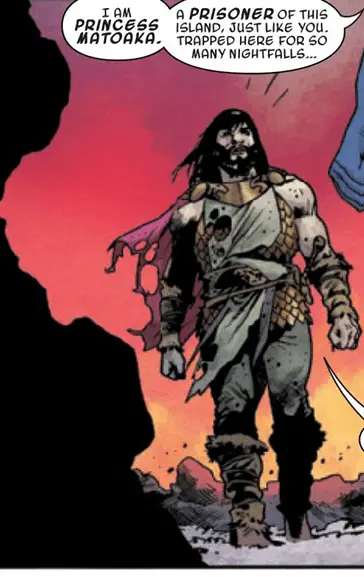TW: Rape, colonialism, violence
Controversy surrounding depictions of Native Americans in comics were sparked earlier this week when Indigenous comics fans took issue with the depiction of Pocahontas in February’s issue of King Conan. In the comic by Jason Aaron, the titular Conan finds a woman marooned on an island of the dead. Skimpily dressed like most women Conan meets, she offers herself to him in exchange for a rescue from said island. (EN: We will not be using direct of the character since we don’t want to continue perpetuating harmful images, though some linked tweets use them as reference)

The problem raised by many on Twitter was the name of said woman: Princess Matoaka, the original birth name of the woman we know culturally by her nickname Pocahontas. It was first mentioned by Kelly D’Angelo, a member of the Haudenosaunee Tuscarora and writer on TV shows Miracle Workers, Final Space, Mao Mao and My Little Pony as well as for Dungeons & Dragons.
Matoaka spends the comic dressed in fetishized clothing and standing in suggestive poses. She is largely defined by her seduction of men. Surrounded by a bizarre mishmash of North and South American Indigenous cultural markers, the whole issue reminded many of the worst parts of Robert E. Howard’s writing. It also reopened wounds in a community that still faces an epidemic of missing and murdered women.
While most associate Pocahontas with the heroic, idealized (and much older) version featured in the 90s animated film by Marvel’s parent company; the real Pocahontas was a teenager. She met John Smith around the age of 13 and was kidnapped by English colonists around the age of 16. While in English custody her first husband was killed, she gave up her daughter, and was raped by her captors. Using a character with her name to homage the outdated “nubile savage” trope of the past was seen as an insult by many indigenous readers.
This was not Aaron’s first foray into Indigenous cultures. He’s also the co-creator of Scalped, a controversial crime series set on a fictional Oglala Lakota Reservation. While it was praised by some when it came out, it was criticized by others for indulging in poverty porn and other harmful Rez stereotypes. After the swift response from the comics community, Jason Aaron issued a statement on the subject:
“In KING CONAN #3, I made the ill-considered decision to give a character the name of Matoaka, a name most closely associated with the real-life Native American figure, Pocahontas. This new character is a supernatural, thousand-year-old princess of a cursed island within a world of pastiche and dark fantasy and was never intended to be based on anyone from history. I should have better understood the name’s true meaning and resonance and recognized it wasn’t appropriate to use it. I understand the outrage expressed by those who hold the true Matoaka’s legacy dear, and for all of this and the distress it’s caused, I apologize. As part of that apology, I’ve already taken what I was paid for the issue and donated it to the National Indigenous Women’s Resource Center. The character’s name and appearance will be adjusted for the rest of this mini-series and in all digital and collected editions.”
While the name and appearance will be changing in future reprints of King Conan #3 per Aaron, the problems this character represents are not going away. Native Americans haven’t had the best history in comics. While most people can easily point out the racist depictions in the westerns of the 50’s or the bizarre tokenism of The Super Friends’ Apache chief, many of the problematic representations Indigenous readers have struggled with are more subtle. And despite small victories here and there like Rebecca Roanhorse’s Echo and the Voices series, there’s clearly some ways to go.
We reached out to Kelly D’Angelo to get her thoughts on how publishers could improve going forward, and she gave this statement:
“To my understanding from what I’ve seen, the response from Marvel was simply an apology. Sadly, we often don’t even get an apology as a people, so that’s a good first step. Acknowledgement.
But to stop the true negligence and harm from these racist depictions and caricatures of our deceased, current, or hypothetical relatives, it’s about more than just “acknowledgement”. It’s about having proper safeguards in place to avoid something like this from happening again. It’s about making us a part of the conversation, minimally, through consultancy or sensitivity reading. But in a hopeful world, we’d be the ones in the room, making the choices, contributing to the art, or writing the words. If one of us was involved in one step of the creation of this comic, someone would have said something.
It’s not just about the fact they used the name of a real little Native girl who suffered. It’s about the fact we are invisible each step in the conversation. It’s about the what’s not seen, too. It’s about the reminder that to many, we don’t exist. We don’t take up an ounce of space in their minds or their thoughts. So acknowledge. But then rectify, repatriate, remove the profit channel, and invest in us, our organizations, and our communities to make a better world.”
If you want to find comics being produced by Native creators, recommendation threads linking to them were put up in wake of the controversy.
Marvel has given no official comment except through Jason Aaron himself, and this article will be updated to reflect changes as the story develops.
Images via Marvel Comics
Have strong thoughts about this piece you need to share? Or maybe there’s something else on your mind you’re wanting to talk about with fellow Fandomentals? Head on over to our Community server to join in the conversation!

